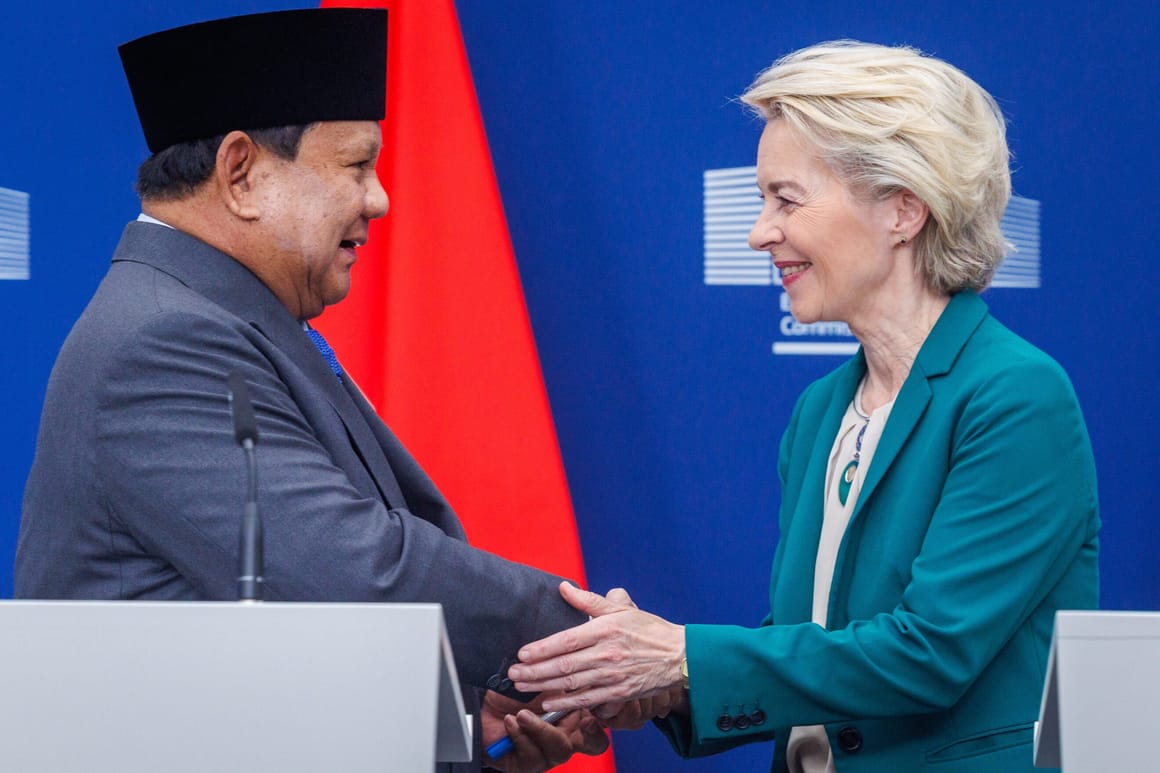Politics
EU Aims to Finalize Trade Deal with Indonesia by September

The European Union is working to finalize a significant trade agreement with Indonesia by September 2023, as stated by EU officials. This effort follows a political agreement announced by European Commission President Ursula von der Leyen after nearly a decade of negotiations. The deal, known as the Indonesia-European Union Comprehensive Economic Partnership Agreement (IEU CEPA), is aimed at strengthening economic ties with the fourth-most populous nation in the world.
In response to trade threats from the United States, particularly a proposed 30 percent tariff from former President Donald Trump, von der Leyen quickly pivoted towards Indonesia. On July 12, 2023, she emphasized the EU’s commitment to “deepening global partnerships” based on rules of international trade. The following day, she met with Indonesian President Prabowo Subianto in Brussels, where they discussed mutual goals of openness and prosperity.
Despite the optimism surrounding the political agreement, Indonesia’s complex trade landscape presents challenges. The country has been criticized for its stringent import restrictions, unpredictable regulations, and bans on raw materials, which complicate negotiations and may hinder progress toward a finalized deal.
Challenges and Opportunities Ahead
The political agreement is seen as a commitment to advance negotiations but does not signify their conclusion. Hosuk Lee-Makiyama, a former trade diplomat, explained that the leaders have merely expressed “the intention to conclude the negotiations.” He indicated that negotiators have been instructed to reach a compromise that can be accepted by both parties.
The EU’s chief negotiator, Fabian Gehl, expressed confidence that the political agreement lays a “firm path” for addressing outstanding issues within the next few weeks. However, given the lengthy discussions that have spanned almost twenty rounds and nearly a decade, the timeline for finalizing the IEU CEPA remains uncertain.
Adding to the complexity, just two days after the meeting between von der Leyen and Subianto, Trump announced a separate agreement with Indonesia that included a 19 percent tariff on Indonesian exports to the U.S. while eliminating tariffs on American exports.
Despite these developments, the lead lawmaker on the EU negotiations, Iuliu Winkler, believes the September deadline is feasible. He noted that resolving outstanding technical issues is “doable” within that timeframe, particularly given the current global context of trade volatility.
Key Issues in Negotiations
There are still significant chapters of the trade agreement that remain under discussion, including topics related to energy, raw materials, import licensing, and sustainable development. A spokesperson for the European Commission, Olof Gill, highlighted the need for fine-tuning market access details for key products. He noted that while there has already been substantial liberalization achieved, further adjustments are necessary for both the EU and Indonesia.
The EU’s commitment to access raw materials is particularly pressing, as it seeks to reduce its dependency on China. Indonesia, being the largest producer of palm oil and a significant supplier of nickel ore, holds strategic importance for the EU. However, Indonesia’s ongoing export ban on nickel ore, which is crucial for electric vehicle batteries, continues to be a sticking point in negotiations.
The EU’s new deforestation regulation, set to take effect on December 30, 2023, adds another layer of complexity. This regulation mandates that Indonesia must demonstrate that its palm oil exports to Europe are not linked to deforestation, a challenging requirement given the country’s history with land-use practices.
While there is hope for advancing the trade agreement, there are still hurdles to overcome, particularly in addressing Indonesia’s protectionist policies. Former EU trade commissioner Cecilia Malmström remarked on the unexpected progress in talks but expressed skepticism regarding the September deadline, suggesting that the end of the year may be a more realistic target.
Despite these challenges, both parties remain optimistic about reaching an agreement. Indonesian Trade Minister Airlangga Hartarto stated that the EU is prepared to offer “special treatment” to palm oil in the pending trade deal, indicating a willingness to address sustainability and transparency concerns.
As the EU and Indonesia move forward, the outcome of these negotiations will have significant implications for economic relations and trade policies in the region, reflecting broader trends in global trade dynamics.
-

 Top Stories3 months ago
Top Stories3 months agoTributes Surge for 9-Year-Old Leon Briody After Cancer Battle
-

 Entertainment4 months ago
Entertainment4 months agoAimee Osbourne Joins Family for Emotional Tribute to Ozzy
-

 Politics4 months ago
Politics4 months agoDanny Healy-Rae Considers Complaint After Altercation with Garda
-

 Top Stories4 months ago
Top Stories4 months agoIreland Enjoys Summer Heat as Hurricane Erin Approaches Atlantic
-

 World5 months ago
World5 months agoHawaii Commemorates 80 Years Since Hiroshima Bombing with Ceremony
-

 Top Stories3 months ago
Top Stories3 months agoNewcastle West Woman Patricia Foley Found Safe After Urgent Search
-

 Top Stories5 months ago
Top Stories5 months agoFianna Fáil TDs Urgently Consider Maire Geoghegan-Quinn for Presidency
-

 World5 months ago
World5 months agoCouple Convicted of Murdering Two-Year-Old Grandson in Wales
-

 World5 months ago
World5 months agoGaza Aid Distribution Tragedy: 20 Killed Amid Ongoing Violence
-

 World5 months ago
World5 months agoAristocrat Constance Marten and Partner Convicted of Infant Murder
-

 Top Stories4 months ago
Top Stories4 months agoClimbing Errigal: A Must-Do Summer Adventure in Donegal
-

 Top Stories4 months ago
Top Stories4 months agoHike Donegal’s Errigal Mountain NOW for Unforgettable Summer Views









